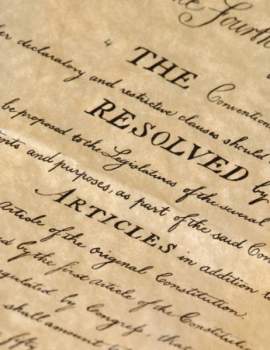
Major Decisions: Epperson v Arkansas

Popular In Constitution
Purpose Of Lifetime Appointment And Pros And Cons Enumerated Powers Bicameral Legislature Background Article 3 Of The Constitution We The People 1st Amendment Who Wrote The Constitution Judicial Review Equal Protection Clause 5th Amendment 10th Amendment Three Fifths Compromise
The Epperson v. Arkansas trial proved to be among the landmark Supreme Court decisions that would have certain questions or considerations based on the application of the United States Constitution. The Epperson v. Arkansas case invokes the occurrences that happened nearly forty years earlier in Tennessee with the infamous Scopes Trial of 1927. Even though Tennessee is one of the most famous states in which the teaching of evolution in schools was prohibited, it was not the only State to apply similar provisions at the State level.
The Scopes trial would be one of the landmark
Supreme Court Decisions that would prove to be repeated in similar fashion once
again with the Epperson v. Arkansas trial. The case revolved around an Arkansas
State provision that prohibited the teaching of human evolution in schools.
This statute, if violated, could levy hefty fines and dismissal from a teaching
position under Arkansas laws.
The
provision would be challenged by a tenth grade biology teacher, Susan Epperson.
Initially, the lower courts would rule in her favor, but an appeal at the
Arkansas Supreme Court would overturn the decision, citing almost no
legislation for the basis of its decision. Epperson would then also appeal and
the case would reach the Supreme Court. Chief Justice Warren would oversee the
proceedings and eventually render a decision in favor of Epperson.
The Supreme Court decision would have ramifications at the
Constitutional level on the basis that Arkansas could not implement statutes or
laws to remove a segment or part of a curriculum on the basis that it conflicts
with certain religious beliefs. This practice is in violation of the First
Amendment of the United States Constitution, and
therefore, unconstitutional. More specifically, it violated the Establishment
Clause of the First Amendment, which states, "Congress shall make no law
respecting an establishment of religion." In seeking to protect certain
religious views that were in conflict with the teaching of evolution, the
Arkansas State laws would effectively be establishing a preference or
inclination toward a particular religious sect.
The Supreme Court decision also regarded that such laws would also infringe on the Fourteenth Amendment, which protects the citizens' from interference imposed by the State legislation or laws with their rights under the First Amendment. Though the main issue at hand was the violation of the First Amendment, the violation of the Fourteenth Amendment was also applied because the State laws imposed a restriction upon the freedom of speech and freedom of religion.
Even though the Court would agree that the issue of school curriculum is to be determined and established by local officials and State governments, it could not impose teachings in which a particular favoritism or inclination toward a religious faction is implemented, either directly or indirectly. Therefore, the Supreme Court decision of Epperson v. Arkansas would not allow the prevention of teaching evolution in schools.
Even though certain states would integrate biblical creation along with evolution as a way to circumvent the landmark Supreme Court decisions, this would only lead to further court decisions in which Epperson v. Arkansas would be used as precedent in the rulings.
NEXT: Mapp v. Ohio




















